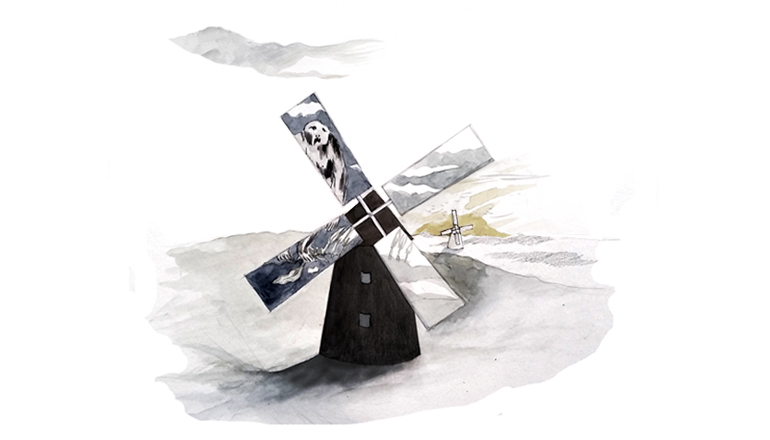Grisóstomo’s Suicide
To David Harsent I call heaven and earth to record this day against you, that I have set before you life and death, blessing and cursing: therefore choose life, that both thou and thy seed may live. (Deuteronomy 30:19) Her name a scar on every tree: “Marcela,” “Marcela” again, hard cut to the tender phloem of the youngest birch, scored in wood with the brittle tip of Grisóstomo’s knife and under the letters, a craggy heart, an inch-wide cleft between its parts. The same knife lies flat, close to the ribs of the scholar’s corpse, now stiff on its bier. *** The Love Song of Grisóstomo: Marcela, basilisk, breaking men’s lives with hardly a breath, you longed for the world to hear of your scorn, yet the roar of the lion, the cry of the owl, the hiss of the viper, the pitiful moans of the widowed dove, or all these sounds merged with the choirs of hell are not music enough to carry my song. Marcela: I could barely hear you for the sound of water flowing over rocks, my sheep calling from the bank, a bitter scent drifting on air. That evening was warm, the clouds light, the wind lazy in the leaves. I would have spoken to you of dusk: a strange purple light starting in the sky, but feared you’d take my words as a sign of the love I’d never feel. Nothing in my silences was cruel. Did you dream of a Messiah, Grisóstomo? Not Him but Her? Imagine a time when the whole constellation of Virgo brightened, long valleys trembled, Astraea the Star Goddess stood on the mountains? Did you think I was her, crook in hand, flock at my feet? Though you willed my gaze to gather you in, I gave you no hope: you know I’m no Goddess, no Goddess -- or all. The Love song of Grisóstomo: What more did you want? What more could I offer but fragments of bone, a knotted string of arteries? I gifted my songs: refrains that ran unbidden through dreams, their supple turns, the sound of water lifting stones, music so fierce the pebbles might bruise. Were these not enough? I drank to your name, morning and night. Marcela: You offered a clutch of forget-me-nots, their new petals cold with the first rain of morning, an unexpected scent of scorch rising through their leaves. I saw you fill your cup and touch it to your lips, though you drank to yourself, to your dream of my name, in love with the dry mechanics of the mind, its grind and repeat. Your libations were hollow, brittle as ash. Some sacred rites become empty: a woman might meet her monthly blood as shame, or debt, or open wound. Love Song of Grisóstomo: Pia desideria: “Beloved Marcela,” “Marcela my wife”. My dreams showed you veiled, carrying flowers. Did I follow you blind? Did I tread on your shadow, unbidden, unblessed, or was I drawn on by something in you: the slope of your neck, the tender arch of a naked foot? Though you gave me no answer, my short life exalts you. Marcela: You were never my Beloved, and I was never yours. Your song was dull: a cold lament, crooned to your image in the lake, to the footnotes in books to the knowing, nodding, faces of your brothers. I know no woman true to the name who doesn’t despise the fallacy of sacrifice, who exalts in a death as needless as yours, though she keeps, as she must, her knowledge close, encoded in her secret heart. And as for “wife” -- did you have it in mind to string me up, as Hera held in golden chains, feet to the clouds, bruising her ribs on the ridges of night, a curse on her lips for the day that she married, a curse on herself for disclosing her names: Cow-face, Goat-Eater, Queen of the Gods. Though “Marcela” is cut through circles of bark, the beech trees still thrive; moonlight is blind to the slow turn of shadows: the shapes of my other names hidden in leaves. *** For his bones, there are herbs: aloe, cassia, hyssop and rue. Blossoms and branches over his grave; a long slab to seal it. They pile up the wood in a circle of stones. His poems burn softly, falling to ash before last light is gone.
